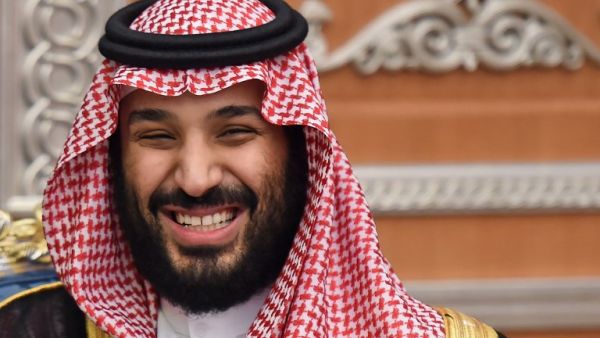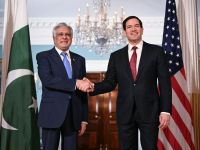by Rosie Alfatlawi
Much to the bemusement of Americans on Twitter, Saudi Crown Prince Mohammed bin Salman is leading the poll for TIME magazine’s person of the year.
That might be news for U.S. President Donald Trump, who did not seem to know there was a public vote.
He claimed in a much-ridiculed tweet Friday that he had taken a “pass” on an interview with the publication because he was only “probably” going to win for a second year.
“The president is incorrect about how we choose person of the year,” TIME replied via Twitter. “Time does not comment on our choice until publication, which is December 6.”
According to its website, TIME says its “editors ultimately have jurisdiction over who is deemed Person of the Year - but the reader plays an important role.”
The accolade, they say, is awarded to the person who has “had the biggest influence over the news.”
In fact, Trump currently has only 4 percent of the vote, far behind Bin Salman who is now on 14 percent having peaked at 21 percent. Of the 33 candidates, the #MeToo campaign is in second place with a 6 percent share.

Some have questioned the authenticity of the vote, however.
“IDK who is voting, but not avg Americans, they can't spell the man's name. Or find Saudi Arabia on a map,” tweeted @jarmstrong1919. As if to prove the point, one tweeter incorrectly identified the 32-year-old as Egypt’s leader.
It was even implied that Saudis might be flooding the poll with votes for their future king.
@tylerlehner tweeted: “Mohammad Bin Salman randomly pulls ahead in the @TIME person of the year poll? Alrighty, KSA.”
Mohammed bin Salman is winning.....I suspect this poll has been compromised since most Americans probably has no idea who he is despite the fact he was in the news last week.
— Cestrum Nocturnum (@Cestrumnocturn1) November 26, 2017
Certainly, multiple replies to TIME on Twitter from Saudi accounts spouted praise for MBS, who “should win it” for “fighting corruption” and “developing Saudi Arabia economically.”
- The New York Times' Long History of Praising Saudi 'Reform'
- Thousands of Twitter Bots Are Attempting to Silence Reporting on Yemen
This is not the first time this month that Saudi Arabia has been accused of artificially promoting their royals in the U.S.
A post by Trump praising “King Salman and the Crown Prince of Saudi Arabia” and suggesting “they know exactly what they are doing” has now been retweeted a massive 101,000 times.
But Exeter University lecturer Marc Owen Jones has suggested that much of that boost came from Saudi-created bots. He found that thousands of the retweets come from apparently fake Riyadh-based accounts.
Others have criticized Bin Salman’s nomination over his role in the devastating Yemen conflict.
I completely disagree with the idea of the award going to Mohammad bin Salman as he continues the war in Yemen and the so-called corruption jailings could just as easily have been about consolidating power.
— Alt-San Juan Isle NP (@AltSanJuanIsNP) November 26, 2017
Hundreds of civilians have been killed in Saudi-led airstrikes which Human Rights Watch have called “unlawful.”
A blockade imposed by Riyadh on the Arab world’s poorest country has also pushed it to the brink of “the largest famine the world has seen for many decades,” according to the U.N.
I was shocked to see SO MANY evil, death causing people on the Time magazine Person of the Year possible list; Mohammed bin Salman? Leader of a repressive government, not that much better than N Korea AND participate in a ‘proxy war’ that is causing starvation, deaths!
— Woulfmann (@woulfmann) November 26, 2017
The TIME recognition of Bin Salman comes as the Saudi crown prince has received praise among some in the West for what has been framed as his reform program.
On Thursday, the New York Times published an opinion piece praising him in superlative terms and claiming Saudi Arabia is going through “its own Arab spring.”
That article, however, was slammed by journalists on Twitter who suggested it failed to interrogate what they suggested was Bin Salman’s false rhetoric of reform.
Glenn Greenwald wrote: “If the Saudi regime bought a full-page ad in the NYT, it'd be less fawning and shameless than this column.”
Commentators have suggested that dramatic changes brought in by Bin Salman and his father in recent months have been primarily aimed at improving Saudi’s global image. Decisions such as allowing women to drive or MBS’ vow to “destroy extremism” appear designed to appeal more to potential foreign investors than to the largely conservative Saudi society.
The anticipated TIME victory, along with the NYT piece and Trump’s Twitter praise, all seem to suggest that, to some extent at least, Bin Salman’s apparent self-promotion campaign is succeeding.







